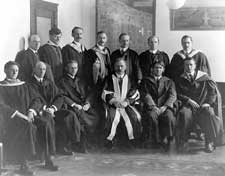| |
 |
| |
Click on image for larger version. |
By Alex Cook, B.Sc. '20.
A year or two ago, a colleague, not in the Department of Mathematics, expressed concern that in these days of severe specialization the University staff might gain in power but suffer from a lack of character-color, and with serious consequences. A relative newcomer to the Campus, he had been impressed by the wealth and variety of character exhibited by the older men. In particular, he named Ernest Sheldon as one of those few remaining to us. Now, too, he has gone. But not sadly, for he left in the midst of renewed friendships, after a busy and happy session at Acadia University, where he had been asked to serve as acting head of mathematics for 1949-50. The final memory of those who met him on that last day was one of the accustomed vigorous, cheerful, keen interest in everything.
If it is the role of the undergraduate teacher to stimulate the intellectual zeal of good students, Sheldon was an undergraduate teacher par excellence. Many students were puzzled by his subtlety: he must have disturbed those for whom ideas were things to be entombed in copy books for future exhumation. He could be expected any moment to deviate from his theme with a remark which could spark the initiated but which probably would confuse the others. Often the remark served as a delayed action fuse. The thought was for reflection: it could lead to conceptions wholly new to the listener.
What has impressed me most about this curious power he had to fire the thinking of others, was that it was by no means the specialist student alone who found new delight in thinking. Often it was the student with little permanent interest in mathematics who derived enormous mental stimulus from this man who could turn words and symbols into unexpected channels of vital meaning. Through the years the company of such students has grown; their lives have been unforgettably enriched by the cheerful sparkle of E.W.S. Far more important than diplomas are minds thus stimulated to think generally. As one such student, I consider this discovery is the best tribute to his memory.
His consuming interest was the University and he worked tirelessly at his interest. In consequence, the Department of Mathematics has always been a healthy department. We were always given freedom to live and breathe.
To return to the concern of my friend mentioned at the outset: can technical specialization alone produce the quality needed in an undergraduate teacher? I think not. Nor will mere libertarianism suffice. The ruins of European society represent a sorry failure in European education. Technical skill is necessary, but it is not sufficient.
Sheldon was stubbornly convinced that human society required more than material freedom and security as its goals. He had convictions about the nature of man and society which developed out of broad reading and constant analysis.
His was not easy idealism; he suffered for his convictions, and what is far more important, he grew because of them. Most of us stop with pharasaism; there is little or nothing the matter with us. Ernest Sheldon passed that stage years ago. He learned that self-righteousness was ultimately self-defeating. This discovery, which apparently few men make, changed his whole outlook. Moreover what he had experienced was joyously real. He had begun to learn what moral greatness could mean. I think it was Sir Alfred Ewing who once remarked that there were few great scientists. Sheldon began to feel in his being what Sir Alfred means. He found new hope and new confidence and an even deeper subtlety of outlook. He was no easy optimist, but he had earned serenity.
"Every man can be termed a chemical mixture of three verbs — being, doing and having. The mixture can vary. Where it is perfect, it is called love."
His was no mournful ending. My abiding memory — picture is that of a cheerful, confident traveller with upraised hand waving his familiar farewell.
Published Fall 1950. |